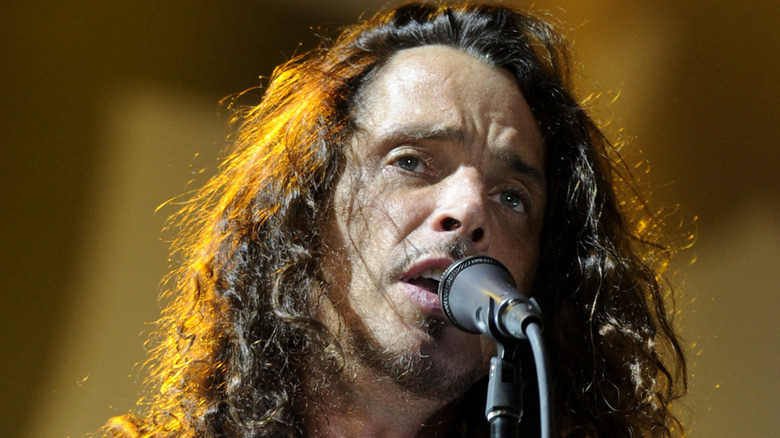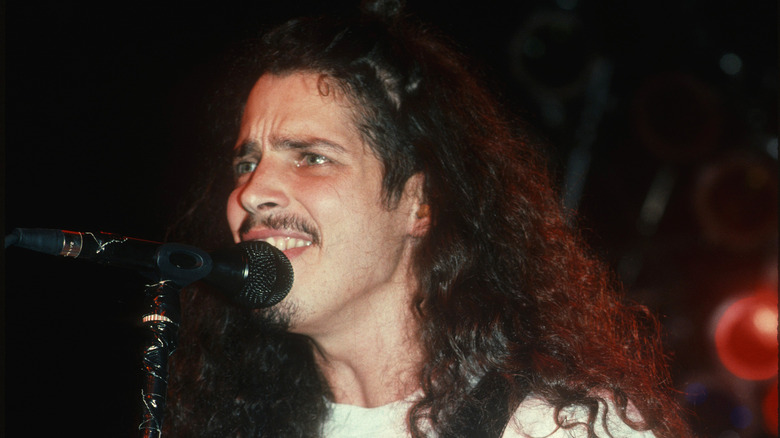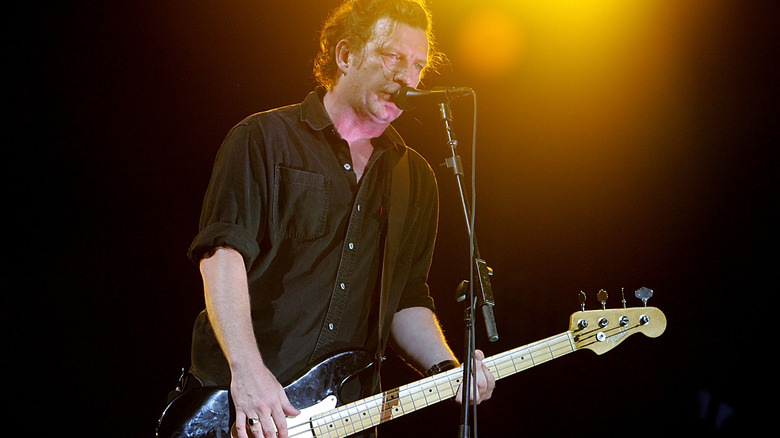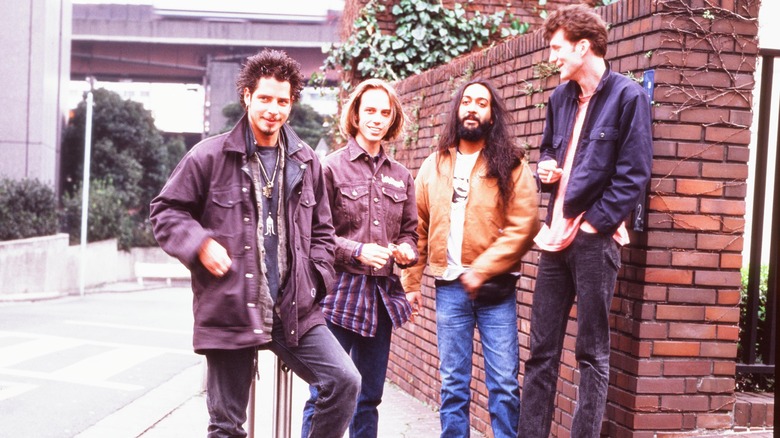The Untold Truth Of Soundgarden
Combining a melting pot of influences that included heavy metal, punk, '70s hard rock, and late-'60s garage rock and psychedelia, Soundgarden had an especially unique sound (no pun intended), even for a genre that stood out for being so different from what was currently on rock radio. They took their tragic personal experiences and transformed them into brooding numbers that epitomized the grunge scene of the early '90s, and while their songwriting approach would become more refined and polished over time, the dark and oftentimes depressing lyrics never went away entirely.
On May 18, 2017, the doom and gloom became all too real when frontman Chris Cornell died by apparent suicide, mere hours after Soundgarden wrapped up a show at the Fox Theatre in Detroit. With Cornell's death, Soundgarden was effectively over, though the band's music still lives on and remains an influence to many younger musicians who want to keep the flames of rock 'n' roll burning in today's drastically different music scene.
Given how Soundgarden achieved so much in a career that dated back to 1984, there's so much about them that longtime devotees and even casual fans are very familiar with. However, there are also some lesser-known facts about the Seattle-based band that deserve a closer look.
If you or anyone you know is having suicidal thoughts, please call the National Suicide Prevention Lifeline at 1-800-273-TALK (8255).
Chris Cornell was the band's original drummer
Even to this day, drummers who also do double duty on lead vocals are a rarity — it isn't easy, after all, to keep time behind the drum kit while also making sure you don't mess up the lyrics onstage. But that's exactly what Chris Cornell's original role in Soundgarden was. Obviously, he didn't turn out to be grunge's answer to Don Henley or Phil Collins, but back in the band's earliest days, he was doing a pretty good job in both of his duties, especially as a drummer. That is, until their songs became more complicated and Cornell had to pick one or the other for the good of the band.
"We were writing songs in odd time signatures, so it became tougher for Chris to sing and play drums at the same time," guitarist Kim Thayil told Kerrang. "He had to choose which instrument to focus on, and we needed to get a fourth member of our band, either a drummer or a singer. [Original bassist Hiro Yamamoto] and I decided we needed a singer, because while Chris was a good singer, we thought he was a bit conventional in his approach, but as a drummer and a songwriter, he was much more inventive."
Fortunately, Cornell knew what he wanted to focus on, and since he felt he'd be more useful as a frontman, he invited his friend, Scott Sundquist, to step in as Soundgarden's new drummer. Sundquist lasted only one year before he was replaced in 1986 by Matt Cameron.
The bassists occasionally sang lead vocals ... with mixed results
It's easy to think of Chris Cornell as the one and only voice of Soundgarden, as his impressive vocal range and endless onstage charisma helped make him one of modern rock's preeminent frontmen. But there were a few (emphasis on a few) occasions where he allowed his bandmates to take over on the mic, starting with founding bassist Hiro Yamamoto's lead vocal turn on "Circle of Power," a track off the band's 1988 debut album "Ultramega OK." Although AllMusic's review described Yamamoto's vocals as "ridiculous," it can be argued that his style was perfect for the song's frantic garage-punk leanings.
In 1994, classic lineup bassist Ben Shepherd (actually the band's third, following Yamamoto and Jason Everman) had his chance to sing lead, and it was probably less surprising on his part, considering how he often did the singing for side projects Hater and Wellwater Conspiracy. That's Shepherd's unorthodox vocals you're hearing on the "Superunknown" deep cut "Half," and if we didn't tell you that song came from Soundgarden's breakout album, you'd probably guess the Middle Eastern-flavored tune was recorded by one of his side bands. The best way to describe "Half" is polarizing; Shepherd himself admitted to Spin that he'd "have to agree with 95 percent of the fans that hate that song."
They had a carefully hidden sense of humor
On the surface, you may think of Soundgarden as a band that specializes in gloomy subject matter, especially with songs such as "Black Hole Sun," "Blow Up the Outside World," and "Fell on Black Days." But they weren't above having some fun in the studio, as particularly evidenced by two of their earlier tunes — "665" and "Big Dumb Sex."
"665" is actually one of multiple joke tracks from "Ultramega OK," and one of two that pokes fun at the "Satanic panic" trend of the decade, which, in part, saw heavy metal bands getting stereotyped as devil worshippers and targeted by parents and moral guardians as a negative influence to the youth. (The other track of this nature, quite predictably, was titled "667.") As seen in this YouTube video, playing "665" in reverse reveals Chris Cornell screaming the praises of a certain man in red — albeit one who lives in the North Pole and not in the fiery depths of hell.
One year later, Soundgarden released their follow-up record, "Louder Than Love," and while there weren't as many joke tracks, the one that wasn't meant to be taken seriously earned them a big ol' Parental Advisory sticker (via Return of Rock). The profanity-laden "Big Dumb Sex" once again showcased Soundgarden trolling before trolling was even a term, this time shifting their focus toward Sunset Strip hair metal bands and their oftentimes raunchy, misogynistic lyrics. (Interestingly, Guns N' Roses covered the song as part of a medley with T. Rex's "Buick Makane" on their 1993 all-covers album, "The Spaghetti Incident?")
Their 1997 breakup: What really happened?
When Soundgarden disbanded for the first time in 1997, it came as a shock to many. "Badmotorfinger," "Superunknown," and "Down on the Upside" were all commercial successes, yielding classic singles that became staples of '90s rock radio. But there was turmoil brewing in private, and rumors swirled regarding substance abuse, creative differences, and other factors that tear bands apart. Ben Shepherd, in particular, was apparently blamed more so than his bandmates; per Rolling Stone, he angrily walked out in the middle of a Soundgarden concert in Hawaii, one that would be their final performance until their 2010 reunion. It was also reported that Shepherd kept talking about his plans to focus on Devilhead, a band that also featured late Mother Love Bone singer Andrew Wood's brothers, Kevin and Brian.
Speaking to Revolver in 2012, Shepherd explained that his tantrum had nothing to do with his bandmates; rather, he was upset that his equipment kept failing on him. Thayil then denied the drug and alcohol abuse rumors, clarifying that nobody went overboard and that it was "burnout and fatigue" that mainly drove the band to break up. This was a point that Chris Cornell agreed with, as he told the publication that Soundgarden had become a "business" where they were no longer in control of things. As for the alleged creative differences? Thayil didn't go into detail, but he did say that everyone in the band was "going in their different directions" ahead of the breakup.
The unfinished final album and numerous legal disputes
Following the release of their 2012 comeback album "King Animal," Soundgarden started teasing the possibility of a new album in 2015 (via Faster Louder). One year later, drummer Matt Cameron told Radio.com that the band had "six solid tunes" for the upcoming release, with Ben Shepherd also teasing the possibility of a new songwriting session in the near future. Tragically, Chris Cornell's death in May 2017 put the band's future in limbo, and while the group disbanded soon after, the surviving members still sought to finish what they started. However, the ongoing legal back-and-forth between the band and Cornell's widow, Vicky, makes it hard to tell whether that final album will ever see the light of day.
"We don't know [where they are]," Kim Thayil told Music Radar in 2019 when asked about the final demos Soundgarden recorded with Cornell. "We've asked nicely, we've suggested that this will benefit all parties, if the band could just have these files, and we could finish the songs we were working on."
As documented by Boston radio station WBOS' website, Soundgarden's recent relationship with Vicky Cornell has been very litigious in nature, and it's not surprising that the band's last demos feature heavily in their lawsuits against each other; for her part, Vicky claims that her late husband was saving those recordings for a solo project. The disputes have even extended to Soundgarden's online presence. In June 2021, the band's surviving members and their management team were given temporary control of their official website and their Facebook, Instagram, and Twitter accounts, several months after Vicky allegedly locked them out from all those sites as well as various other social media platforms (via Billboard).





